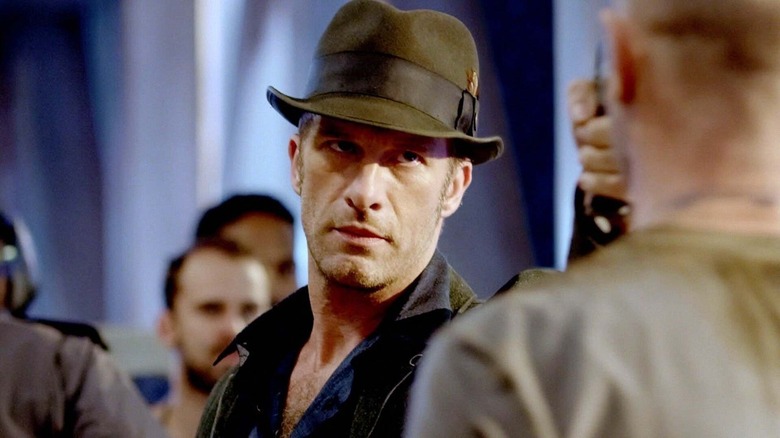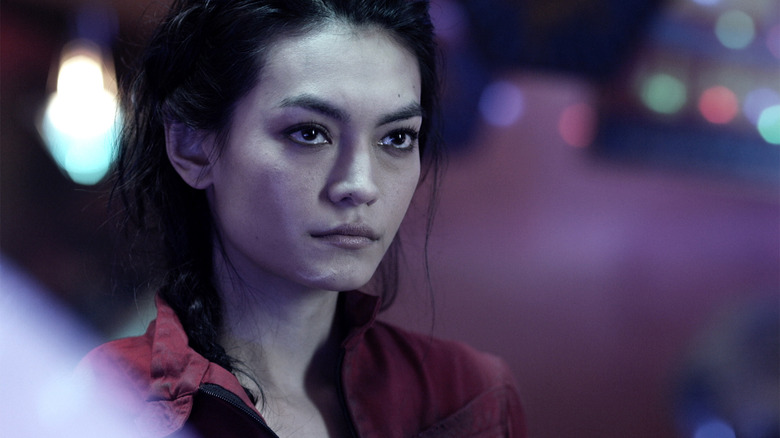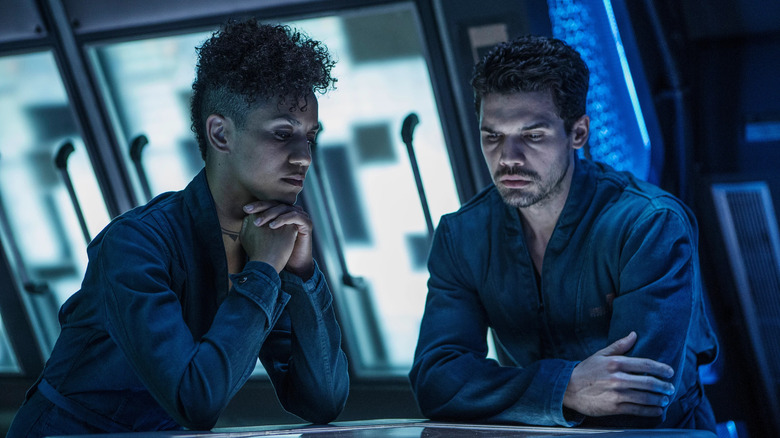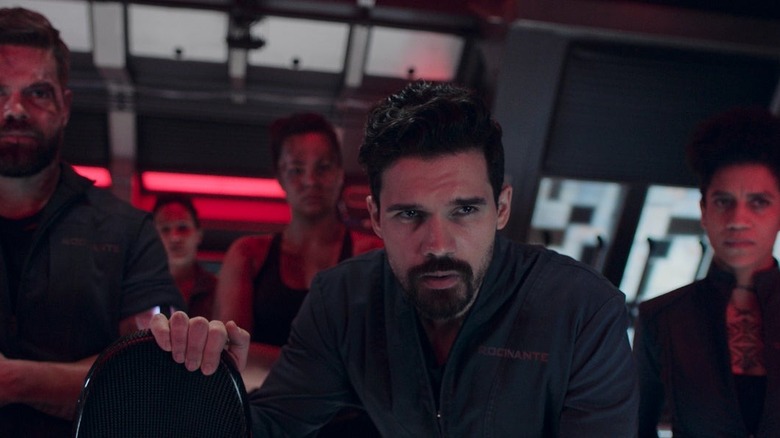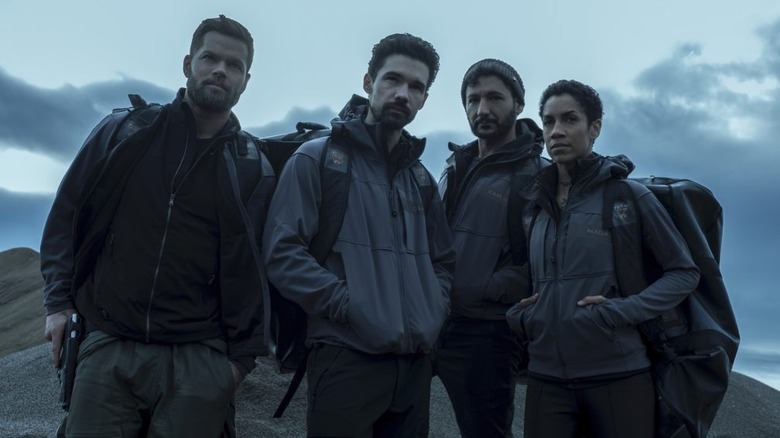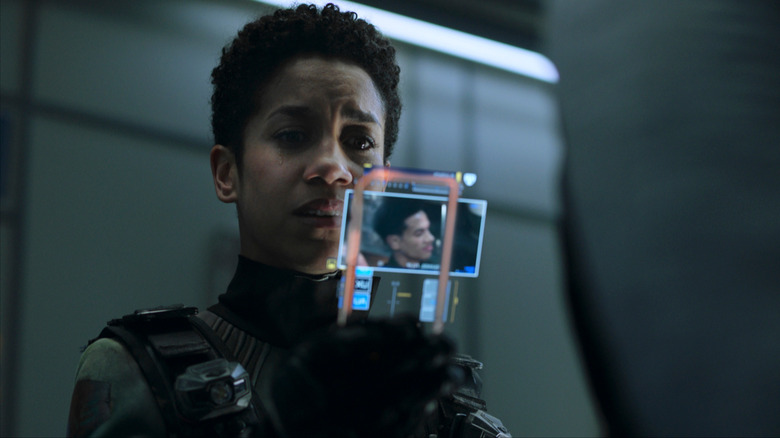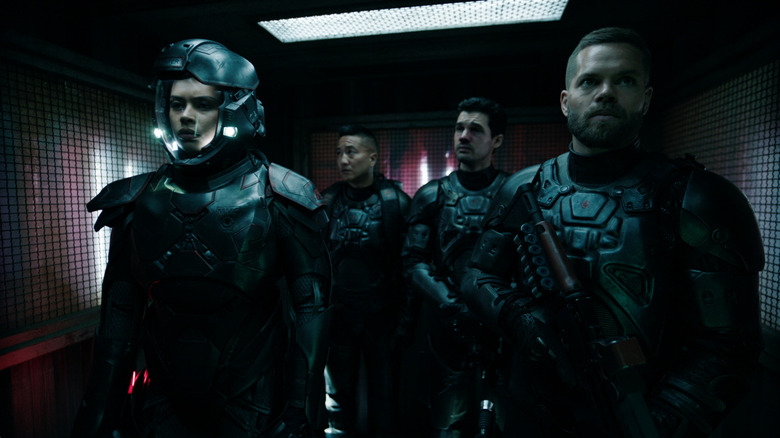Every Season Of The Expanse, Ranked Worst To Best
Daniel Abraham and Ty Franck's hit science fiction novel series, "The Expanse," written under the joint pseudonym James S.A. Corey, has been adapted into an acclaimed television series of the same name. The story begins in a future where humanity has colonized the solar system. Factions on Earth, Mars, and space stations battle for supremacy. The series ran for six seasons, with its first three seasons airing on Syfy while Amazon Studios produced its later half — sending it to stream on Prime Video.
With its interplanetary scope and impressive ensemble cast, "The Expanse" is one of the best sci-fi shows in recent memory and one of Prime Video's most underrated original series. The show is willing to take risks with its story, from the main characters dying to shocking twists every step of the way as the war for humanity's future unfolds. Here is a definitive ranking of all six seasons of "The Expanse." From the shadowy conspiracies that defined its early years to the all-out war that drove its latter half, let's dig into the best the show has to offer.
6. Season 1
Building a science fiction world and ensemble of characters from the ground up is never an easy proposition. Given its sheer scope, "The Expanse" has its work cut out for itself coming out of the gate. The show's inaugural season introduces James Holden (Steven Strait) and his crew, caught in an interplanetary conflict after the destruction of their freighter. Holden and his surviving friends take over a Martian gunship, renaming the Rocinante, while Joe Miller (Thomas Jane), a detective at Ceres Station, investigates the disappearance of a young woman.
Even in its early episodes, the show's storytelling strengths are on full display, including its tendency to kill off seemingly important characters: This choice keeps the audience readied for the next surprise. "The Expanse" balances its sweeping sci-fi scope with humanistic stakes, countering Holden and Miller's more intimate adventures with political maneuvering, led by United Nations executive Chrisjen Avasarala (Shohreh Aghdashloo). However, growing pains are evident — from requisite world-building exposition to the show still figuring out its narrative pacing.
5. Season 2
If the inaugural season of "The Expanse" throws down the pieces of this grand jigsaw puzzle, the show's second season is when these seemingly disparate parts start to come together. The mystery behind the protomolecule, the sentient bioweapon that wiped out the space station on the asteroid Eros, slowly begins to reveal itself. Meanwhile, Earth and Mars face off within a tense political arena. Through it all, Holden and the crew of the Rocinante find themselves in the middle of this deadly conspiracy.
While some issues with its premiere season are still present in the second season of "The Expanse," the show's overall narrative has become tighter. Killing off Thomas Jane's character, one of the most well-known actors in the cast, in the middle of the season underscored the show's unpredictable stakes. The addition of Frankie Adams and Cara Gee, as Martian soldier Bobby Draper and Belter security chief Camina Drummer, respectively, is season 2's greatest strength. The two characters would later become fan favorites and elevate the overall quality of the series while figuring prominently into its overarching narrative.
4. Season 6
"The Expanse" ended with season 6, with Earth on the defensive from the villainous Belter leader Marco Inaros (Keon Alexander) as he bombards his enemies with asteroids. While boasting an ambitiously epic scope and some of the show's most thrilling action set pieces, the season is operating with a noticeably truncated episode order – having only six episodes to wrap the story. This condensed runtime is all the more noticeable with interlinking prologues separate from the main narrative that, I presume, help set up an intended (but unannounced or greenlit) spinoff series.
I don't mean that "The Expanse" end its run on a unsatisfying note: It's fitting, and its cast are turning in some of their finest performances here. Watching how far characters like Holden, Avasarala, and Drummer have grown across the series feels organically earned and delivered with plenty of solid character moments. However, everything feels a bit rushed — from Inaros' steady loss of support among the Belters to Earth and Mars seizing wartime advantage. Really, I just wish that the final season had more episodes to stick the landing more smoothly. Still, I'm relieved that it all worked out as well as it did.
3. Season 4
Whenever a show switches networks or platforms, it can feel aesthetically off from what came before. But "The Expanse" organically transitions from Syfy to Prime Video with its fourth season. However, what makes this season so odd in the grand scheme of its run is that it mostly takes place on the exoplanet Ilus because humanity begins settling on worlds outside of the solar system. After three seasons of claustrophobic settings on cramped ships and space stations, the change to open landscapes is jarring, especially when binging the entire series.
Of course, the interplanetary intrigue and explosive action sequences remain just as ambitious and expertly executed as ever — minus the constant possibility of characters ending up sucked into the vacuum of space. Most importantly, the fourth season marks the debut of Inaros, who quickly maneuvers himself to become the principal antagonist for the remainder of the show's run. "The Expanse" quietly pushed the boundaries of what it could be as it moved to Prime Video but would wisely return much of the action to outer space in its following season.
2. Season 5
The show's penultimate season sees "The Expanse" get back to what it does best, leaning into an all-out war that immediately puts the heroes on the defensive. With Inaros now leading the Belter paramilitary group, the Free Navy, Earth and Mars quickly find themselves at the mercy of the cunning leader's brutal tactics. To make matters more intimately ugly, Inaros teams up with Filip (Jasai Chase Owens), the adult son of Inaros and Holden's longtime lover and confidante, Naomi Nagata (Dominique Tipper).
The fifth season tonally feels like "The Empire Strikes Back," with the might of the Free Navy incurring heavy losses on all of Inaros' opposition throughout its 10 episodes. However, the show's true strength has always been in the complicated dynamics between its characters. Amidst the planetary bombardment, "The Expanse" keeps sight of this strength, deepening its flair for character study. A return to form, it's the fifth season where "The Expanse" feels like it's taken advantage of Prime Video's production potential, delivering cinematic-level sci-fi action.
1. Season 3
After leaning into neo-noir mystery with its first season and an interplanetary political thriller with its second, "The Expanse" first transformed into a war show with its third season. Tensions between the different factions come to a head, leading to an explosive conflict while the intrigue surrounding the protomolecule escalates. Characters become forced to choose sides, with the Rocinante crew seeing some crucial changes.
"The Expanse" has always been a show with high stakes, but the third season is the first time it feels like the fate of the entire human race is hanging in the balance. More self-assured than previous seasons and with the benefit of breathing room — especially compared to its final season — season three is a war story done right. With the culmination of the main ensemble's character arcs, season 3 was one that kept audiences riveted with its high-flying action and guessing over true loyalties. "The Expanse" was a great series from top to bottom, but its third season best exemplifies what made the show such a critical hit.
